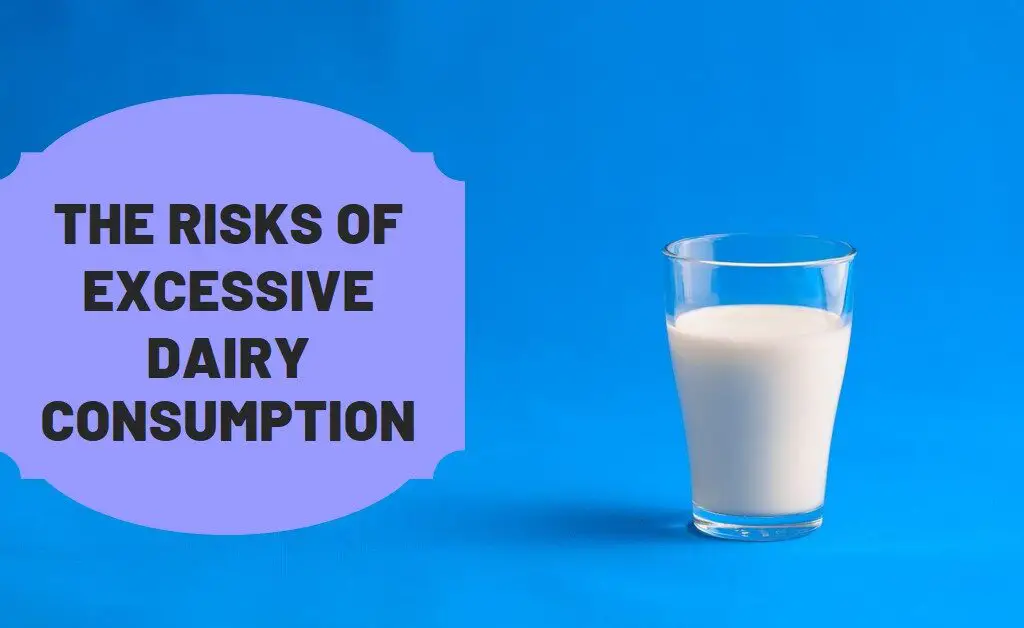Key Takeaways: Know about What are the risks of excessive dairy consumption?
- Excessive dairy consumption may increase the risk of certain health issues like heart disease, prostate cancer, and weight gain due to the high saturated fat and calorie content. However, moderate dairy consumption can also have health benefits.
- People with lactose intolerance need to limit dairy intake to prevent gastrointestinal issues. Using lactose-free dairy products can allow some dairy consumption.
- The risks and benefits of dairy likely depend on the type of dairy food (milk, cheese, yogurt, etc.), the fat content, and the overall diet pattern.

What is Dairy?
Dairy products include milk, yogurt, cheese, ice cream, butter, and cream obtained from cows, goats, sheep, and other mammals [1].
Dairy products are good sources of various nutrients like protein, calcium, phosphorus, vitamin A, vitamin D, vitamin B12, riboflavin, and zinc, which offer potential health benefits [2]. However, some dairy products also contain high amounts of saturated fat and cholesterol, which may negatively impact health when consumed in excess. Now, let’s discuss about, What are the risks of excessive dairy consumption?
Potential Health Risks of Excessive Dairy Consumption
Heart Disease
Some research indicates that high dairy intake may increase the risk of heart disease, likely due to the high saturated fat content [3]. However, the relationship is complex with other studies showing cardiovascular benefits or no clear link between dairy consumption and heart disease [4][5][6].
The risks and benefits may depend on:
- Type of dairy food: Cheese and yogurt appear more beneficial compared to milk or butter [4]
- Fat content: Lower fat dairy may have more cardiovascular benefits than full-fat options [5]
- Overall diet: Dairy’s effects likely depend on whether it replaces saturated fats, refined carbs, or healthy unsaturated fats [6]
Weight Gain
Some research indicates that high intakes of high-fat dairy foods may contribute to weight gain over time [7]. However, yogurt and low-fat dairy appear beneficial for weight management [8][9].
Prostate and Ovarian Cancer
High dairy intake may increase prostate cancer risk, possibly due to high calcium intakes [10]. The data for ovarian cancer risk is mixed [7].
Lactose Intolerance
People with lactose intolerance experience gastrointestinal symptoms like diarrhea, bloating, and gas with dairy consumption [11]. Using lactose-free dairy or taking lactase enzyme supplements allows some dairy intake [12][13].
Potential Health Benefits of Dairy
Bone Health
Adequate dairy intake benefits bone mineral density and may reduce osteoporosis and fracture risk [14][15].
Blood Pressure
Low-fat dairy intake may help reduce high blood pressure [5][16].
Colorectal Cancer
Higher intakes of milk and calcium may reduce colorectal cancer risk [17].
Type 2 Diabetes
Some research shows that dairy intake, particularly yogurt, may reduce type 2 diabetes risk [18][9].

How Much Dairy Can You Safely Consume?
The 2020-2025 Dietary Guidelines for Americans recommend 3 servings of dairy per day based on a 2000 calorie diet, with serving sizes as [19]:
- 1 cup milk or yogurt
- 1.5 ounces natural cheese
- 2 ounces processed cheese
However, those with lactose intolerance may need to limit intake and choose lactose-free options [11][12]. Older adults should also limit saturated fat intakes to less than 10 grams per day, which may require reduced dairy consumption or selecting low-fat products [16].
Tips for Healthy Dairy Consumption
- Choose low-fat or nonfat dairy products more often
- Enjoy yogurt and small amounts of cheese over milk or butter
- Select lactose-free products if lactose intolerant
- Limit added sugars by choosing plain over flavored products
- Consume dairy as part of an overall healthy, balanced diet
The Bottom Line
The health effects of dairy likely depend on the type of dairy food, fat content, and overall dietary pattern. Moderate intake with an emphasis on yogurt and low-fat products may provide benefits for bone, blood pressure, diabetes, and colorectal cancer risk, without increasing heart disease or weight gain risk. Lactose intolerant individuals can experiment with small amounts of dairy and lactose-free alternatives to find an approach that minimizes symptoms.
Frequently Asked Questions
Q: Is dairy good or bad for you?
A: Dairy likely provides both risks and benefits – moderate intake may benefit bone health but excessive intake may increase heart disease or prostate cancer risk. Overall effects depend on the type and fat content of dairy foods and the overall diet pattern.
Q: How much dairy per day is healthy?
A: Guidelines recommend 3 servings of dairy per day based on a 2000 calorie diet. However, those with lactose intolerance may need to limit intake and choose lactose-free options. Older adults should also limit saturated fat intakes, which may require reduced dairy consumption or selecting low-fat products.
Q: What are signs of lactose intolerance?
A: Common symptoms of lactose intolerance include bloating, diarrhea, gas, abdominal cramps, and nausea after consuming dairy products. These symptoms usually start 30 minutes to 2 hours after eating dairy.
Q: What dairy has the least lactose?
A: Aged, hard cheeses (cheddar, parmesan, Swiss) and probiotic yogurts are naturally lower in lactose and may be tolerated by some people with lactose intolerance. Butter and lactose-free milk and dairy products are also very low in lactose.
Q: Can you lose weight eating dairy?
A: It depends – high intakes of high-fat dairy may contribute to weight gain over time, but yogurt and low-fat dairy appear beneficial for weight management.
Q: Is dairy good for weight loss?
A: Research shows mixed effects – high-fat dairy may contribute to increased body weight over time, but low-fat dairy like yogurt appears beneficial for weight loss in some studies. An analysis of multiple studies (meta-analysis) also found yogurt consumption linked to less weight gain .
Q: Does dairy increase breast cancer risk?
A: The data on dairy and breast cancer risk are inconclusive. Some research links high milk intake to increased risk. Proposed mechanisms involve cow’s milk increasing insulin-like growth factor (IGF-1) levels and impacting estrogen . But more research is needed, especially on low-fat dairy intake.
Q: Is full-fat or low-fat dairy better?
A: For heart health, research indicates low-fat dairy has more benefits. A review of studies found it linked to lower risk of cardiovascular disease while full-fat dairy appears neutral or harmful . Fat-free and low-fat milk also resulted in more weight loss compared to whole milk in a 1-year trial .
Q: What are the best dairy sources of protein?
A: Milk provides 8 grams of high-quality milk protein per cup with all essential amino acids. Greek yogurt packs around 20 grams per serving. Cheese also provides substantial protein but can be higher in saturated fatty acids.
Q: How does United States dairy consumption compare globally?
A: Average dairy intake varies globally, with the United States consuming high amounts at 639 grams per person per week compared to Western Europe (390 g) and developing nations like China (25 g) .
.Q: What are the risk factors linked to high dairy intake?
A: Potential risk factors associated with excessive dairy include increased heart disease and weight gain risk (especially from high-fat products), prostate cancer risk (from high calcium intake), and bone fractures in those with lactose intolerance who avoid dairy .
Q: Is a plant-based diet better than dairy products?
A: Some research suggests plant-based diets reducing heart disease, cancer, and mortality risk more than dairy-inclusive diets . But incorporating some dairy may still be safe and beneficial. Overall diet quality appears most important.
Q: How does milk consumption affect children versus adults?
A: Milk is important for kids for bone development but intake declines with age. The nutrients and saturated fats in milk may impact adults differently than children. Cow’s milk also does not provide nutrition tailored for grown humans unlike human breastmilk for infants.
Q: Should you avoid dairy products when sick?
Some avoid dairy when sick believing it increases mucus production. But scientific evidence does not support dairy increasing respiratory tract symptoms or infections. Some data suggests yogurt benefits respiratory and gut immunity.
Q: What vitamins are found in dairy products?
A: Dairy products like milk, yogurt, and cheese provide good amounts of vitamins A, D, B2 (riboflavin), B12, and minerals like calcium, phosphorus, zinc, iodine, potassium, and selenium. Fortified dairy products also provide supplemental vitamin D.
Q: Can drinking a glass of milk help you sleep?
A: Warm milk is a common home remedy due to tryptophan. But evidence shows little effects on sleep duration or quality . The lactose can also cause digestive issues interfering with sleep. Some data suggests yogurt improves sleep efficiency.
Q: What are the environmental impacts of dairy production?
A: Dairy farming requires substantial land and water resources. Cow digestion also yields methane emissions. Reducing milk and dairy intake can benefit environmental sustainability. Further research explores how to balance nutrition needs with ecosystem impacts.
Q: Are there any risks for children who consume dairy?
A: Milk allergies affect 2-3% of kids. Lactose intolerance can also develop with age and limit dairy tolerance. Some concerns exist about early cow’s milk intake increasing diabetes risk, but evidence remains limited without long-term studies.
Citations: [1] https://medi-temple.com [2] https://www.pcrm.org/good-nutrition/nutrition-information/health-concerns-about-dairy [3] https://my.clevelandclinic.org/health/diseases/7317-lactose-intolerance [4] https://www.ncbi.nlm.nih.gov/pmc/articles/PMC8875110/ [5] https://www.ncbi.nlm.nih.gov/pmc/articles/PMC3289141/ [6] https://medi-temple.com/privacy-policy/ [7] https://www.health.harvard.edu/blog/dairy-health-food-or-health-risk-2019012515849 [8] https://www.webmd.com/diet/foods-high-in-lactose [9] https://pubmed.ncbi.nlm.nih.gov/25740747/ [10] https://medi-temple.com/contact/ [11] https://www.ncbi.nlm.nih.gov/pmc/articles/PMC5122229/ [12] https://www.healthline.com/nutrition/dairy-foods-low-in-lactose [13] https://www.hsph.harvard.edu/nutritionsource/2016/10/25/dairy-fat-cardiovascular-disease-risk/ [14] https://www.eatingwell.com/article/8031955/is-dairy-good-for-you/ [15] https://www.hopkinsmedicine.org/health/conditions-and-diseases/lactose-intolerance [16] https://www.health.harvard.edu/heart-health/whats-the-deal-with-dairy-and-heart-health [17] https://www.ncbi.nlm.nih.gov/pmc/articles/PMC4703621/ [18] https://www.webmd.com/digestive-disorders/ss/slideshow-dairy [19] https://academic.oup.com/eurjpc/article/30/3/219/6711074 [20] https://nutritionandmetabolism.biomedcentral.com/articles/10.1186/s12986-020-00527-y [21] https://www.foodallergy.org/resources/milk-allergy-vs-lactose-intolerance [22] https://www.thelancet.com/journals/lancet/article/PIIS0140-6736%2818%2931812-9/fulltext [23] https://www.forksoverknives.com/wellness/7-ways-milk-and-dairy-products-are-making-you-sick/ [24] https://www.nhs.uk/conditions/lactose-intolerance/ [25] https://www.bhf.org.uk/informationsupport/heart-matters-magazine/news/behind-the-headlines/dairy-fat-and-heart-disease